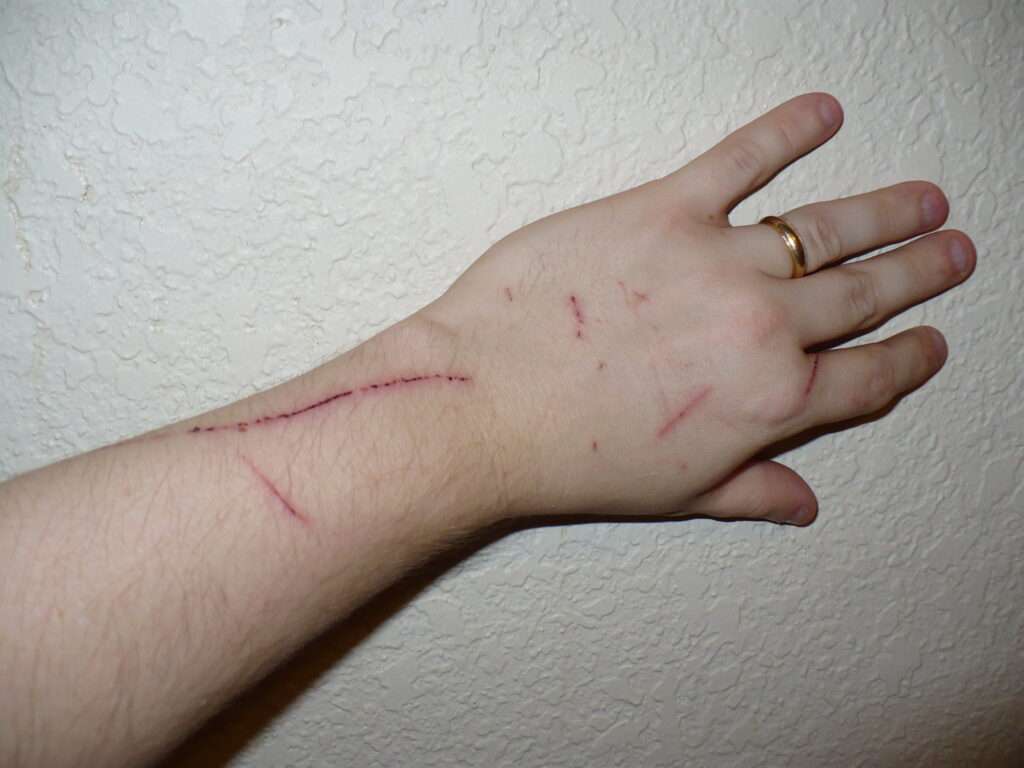Why Do Cat Scratches Itch? The Science Behind the Persistent Itch
Welcome, fellow feline enthusiasts, to a comprehensive guide that delves into the intriguing world of cat scratches and the persistent itchiness they often bring. If you’ve ever found yourself wondering why those seemingly harmless scratches from your beloved cat can leave you scratching your head, fear not! We’re here to shed light on this itchy phenomenon and provide you with a deeper understanding of the factors at play.
Anatomy of a Cat’s Claw
When it comes to cat scratches, understanding the anatomy of a cat’s claw is crucial. These retractable weapons are more than just adorable accessories for our furry friends—they serve essential purposes. A cat’s claw consists of a curved, sharp outer layer called the sheath and a strong, curved inner core known as the bone. This structure allows cats to extend and retract their claws effortlessly, aiding in various activities such as climbing, hunting, and self-defense.
Cat Scratch Disease (CSD)
While we adore our feline companions, it’s essential to be aware of potential health concerns associated with cat scratches. One such concern is Cat Scratch Disease (CSD). Caused by a bacterium called Bartonella henselae, CSD can lead to unpleasant symptoms, including itchiness.
Transmission of the bacteria usually occurs when an infected cat scratches or bites a human, breaking the skin and introducing the bacteria into the body. The symptoms of Cat Scratch Disease can vary from mild to severe and often include swollen lymph nodes, fatigue, fever, and yes, you guessed it—itchiness! This itchiness is the result of the body’s immune response to the presence of bacteria, triggering inflammatory reactions that can lead to discomfort and scratching.
It’s important to note that not all cat scratches will result in CSD. The risk increases when the scratch is deep or if the cat’s claws were contaminated with bacteria. Individuals with compromised immune systems, such as young children or those with certain medical conditions, may be more susceptible to developing CSD. If you suspect you have CSD, it’s crucial to seek medical attention for proper diagnosis and treatment.
In our upcoming sections, we’ll dive deeper into other factors contributing to cat scratch itchiness, including allergies and the impact of scratching on the skin. So, grab a cup of tea, get cozy, and let’s continue exploring the captivating world of cat scratch itchiness.
Cat Scratch Allergies
Just like humans, cats can carry allergens that can cause itching and discomfort when they come into contact with our skin. Cat scratch allergies, also known as cat scratch fever or cat scratch syndrome, occur when an individual has an allergic reaction to proteins found in a cat’s saliva, dander, or urine. These allergens can be transferred to their claws during grooming, making cat scratches a potential trigger for itching.
The common symptoms of cat scratch allergies include redness, swelling, and intense itching at the site of the scratch. Some individuals may also experience respiratory symptoms such as sneezing or a runny nose if they are highly sensitive to these allergens. It’s important to note that not everyone will develop an allergic reaction to cat scratches, as individual sensitivities vary.
Scratching and Its Impact on the Skin
Have you ever wondered why scratching a cat scratch can provide temporary relief from the itch? Scratching activates nerve endings in the skin that override the itching sensation temporarily. However, this relief is short-lived and can lead to a vicious cycle of scratching, further aggravating the skin.
While scratching may provide momentary respite, it can actually worsen the itching in the long run. The mechanical action of scratching damages the skin further, causing tiny tears and micro-abrasions. These small wounds can become breeding grounds for bacteria, potentially leading to infections that intensify the itchiness.
Moreover, scratching can also trigger the release of histamines, substances that contribute to the body’s inflammatory response. This release of histamines can further exacerbate the itching and prolong the healing process.
Understanding the impact of scratching on the skin can help us adopt more effective strategies to manage the itchiness caused by cat scratches. In the following sections, we will explore cat allergens and their effects on human skin, the correlation between infection and itchiness, and practical tips for treating and preventing cat scratch itchiness. So, let’s continue our journey to unravel the mysteries of these itchy encounters.
Cat Allergens and Their Effects on Human Skin

Cats are known for their captivating charm and delightful companionship. However, for some individuals, exposure to cat allergens can lead to unwelcome itching and discomfort. Cat allergens are proteins found in a cat’s saliva, dander (tiny flakes of skin), and urine. When these allergens come into contact with sensitive human skin, they can trigger an immune response, leading to itching and various allergic reactions.
Cat allergens have the ability to adhere to a cat’s claws during grooming. So, when your feline friend extends those cute little paws and playfully scratches you, it may introduce these allergens into your skin, resulting in itchiness. For individuals with cat allergies, even minimal exposure to these allergens can cause an array of symptoms, including redness, itching, sneezing, and congestion.
It’s important to note that the severity of cat allergen-induced reactions can vary from person to person. Some individuals may experience mild itchiness, while others may develop more pronounced symptoms. If you suspect you have a cat allergy, it’s advisable to consult with a healthcare professional for proper diagnosis and guidance.
Infection and Itchiness
While most cat scratches heal without complications, there is a risk of infection that can intensify itchiness and delay the healing process. Cats are natural explorers, and their paws can come into contact with various bacteria and microorganisms in their environment. If a scratch breaks the skin, these bacteria can enter the wound, leading to an infection.
An infected cat scratch can cause redness, swelling, increased pain, and persistent itching. The body’s immune response to the infection contributes to these uncomfortable symptoms. It’s important to keep a close eye on any scratch that shows signs of infection and seek medical attention promptly.
Preventing infection is crucial in managing cat scratch itchiness. Clean the scratch gently with soap and water, apply an antibiotic ointment, and cover it with a clean bandage. If you notice worsening symptoms or signs of infection, such as increasing redness, warmth, or pus, it’s essential to consult a healthcare professional for proper evaluation and treatment.
In our upcoming sections, we will explore various ways to treat itchiness resulting from cat scratches, the importance of prevention, and when it’s necessary to seek medical attention. So, let’s continue our journey toward understanding and addressing the itch factor associated with cat scratches.
Treating Itchiness from Cat Scratches
Cat scratch itchiness can be incredibly bothersome, but fear not! There are several approaches you can take to find relief from the persistent itching.
- General Tips for Managing Cat Scratch Itchiness:
- Keep the affected area clean and dry.
- Avoid scratching the itch, as it can further irritate the skin.
- Apply a cold compress to reduce inflammation and soothe the itch.
- Over-the-counter anti-itch creams or lotions can provide temporary relief.
- Take over-the-counter antihistamines to alleviate itching (consult a healthcare professional before use).
- Over-the-Counter Remedies for Itch Relief:
- Topical corticosteroid creams or ointments can help reduce inflammation and itching.
- Calamine lotion or hydrocortisone cream can provide soothing relief.
- Antihistamine creams or oral medications can help alleviate itching caused by allergic reactions.
- Medical Interventions and Treatments:
- If the itchiness persists or becomes severe, consult a healthcare professional for a proper evaluation.
- Prescription-strength corticosteroid creams or ointments may be recommended for more persistent cases.
- In certain cases, oral corticosteroids or other prescription medications may be prescribed to manage the itch.
Remember, it’s essential to follow the guidance of a healthcare professional when seeking treatment for cat scratch itchiness, especially if the symptoms are severe or accompanied by signs of infection.
Prevention is Key

Preventing cat scratch itchiness starts with taking proactive measures to minimize the risk of scratches and reduce exposure to potential allergens. Here are some tips to keep in mind:
- Regular Cat Grooming:
- Keep your cat’s claws trimmed to minimize the likelihood of deep scratches.
- Regularly brush your cat to reduce loose hair and dander, which can carry allergens.
- Use cat-friendly grooming tools and techniques to ensure a stress-free experience for your feline friend.
- Proper Interaction:
- Teach children and family members how to handle and interact with cats gently to avoid scratches.
- Observe your cat’s body language and signals to identify when they may be agitated or prone to scratching.
- Personal Hygiene:
- Wash your hands thoroughly after interacting with cats, especially before touching your face or sensitive areas of your skin.
- Avoid rubbing your eyes or face after handling cats to minimize the risk of transferring allergens.
- Creating Cat-Friendly Spaces:
- Designate specific areas or furniture where cats can scratch and play, such as scratching posts or cat trees.
- Provide toys and activities to keep your cat engaged and reduce the likelihood of them resorting to scratching.
By implementing these preventive measures, you can significantly reduce the chances of experiencing cat scratch itchiness. Remember, a little prevention goes a long way in ensuring a harmonious and itch-free relationship with your feline companion.
When to Seek Medical Attention
While most cases of cat scratch itchiness can be managed at home, there are instances where seeking medical attention is necessary. It’s important to be aware of the signs that indicate a need for professional evaluation and care. Consider consulting a healthcare professional if:
- The itchiness persists or worsens despite home remedies.
- The scratch shows signs of infection, such as increasing redness, warmth, or pus.
- The surrounding area becomes swollen or develops a rash.
- You experience other concerning symptoms, such as fever, fatigue, or swollen lymph nodes.
A healthcare professional will be able to provide a thorough evaluation, diagnose any underlying conditions, and recommend appropriate treatments. Remember, it’s better to err on the side of caution and seek medical attention when in doubt.
Conclusion
Congratulations! You have now journeyed through the fascinating realm of cat scratch itchiness and gained a deeper understanding of its various facets. We explored the anatomy of a cat’s claw, delved into the causes and effects of cat scratch allergies, and uncovered the potential risks of cat scratch dermatitis and infections.
We also learned how scratching, while providing temporary relief, can worsen the itchiness and delay the healing process. Through our exploration, we discovered ways to treat cat scratch itchiness, including over-the-counter remedies and medical interventions. Furthermore, we emphasized the importance of prevention in minimizing the itch factor associated with cat scratches.
Remember, if you experience persistent or severe itchiness, it’s crucial to consult with a healthcare professional for proper evaluation and guidance. They will help determine the underlying causes and recommend the most appropriate treatments.
By implementing preventive measures, maintaining good personal hygiene, and seeking timely medical attention when needed, you can navigate the world of cat scratch itchiness with confidence and minimize its impact on your well-being.
So, continue to enjoy the wonderful companionship of your feline friends while staying vigilant and informed about cat scratch itchiness. Armed with knowledge and preventive measures, you can create a harmonious and itch-free environment for both you and your beloved cat.
Frequently Asked Questions
Q: Why do cat scratches itch?
A: Cat scratches can introduce bacteria into your skin, triggering an immune response. This immune response leads to inflammation and the release of chemicals that cause itching.
Q: Are all cat scratches itchy?
A: Not all cat scratches result in itchiness. Itchiness depends on the presence of bacteria, such as Bartonella henselae, and an individual’s immune response to it.
Q: How long does the itchiness from cat scratches last?
A: The duration of itchiness can vary from person to person and depends on factors such as the severity of the scratch and individual immune response. Itchiness typically resolves within a few days to a couple of weeks.
Q: Can I prevent cat scratch itchiness?
A: While it may not be possible to completely prevent itchiness from cat scratches, you can minimize the risk by keeping your cat’s claws trimmed, practicing proper wound care if you get scratched, and seeking medical attention if the scratch becomes infected.
Q: When should I seek medical attention for cat scratch itchiness?
A: If the itchiness persists, worsens, or is accompanied by other concerning symptoms such as excessive swelling, redness, or signs of infection, it’s advisable to seek medical attention for proper evaluation and treatment.
Q: Why does it itch when a cat scratches you?
A: Cat scratches can introduce bacteria into your skin, triggering an immune response. This immune response leads to inflammation and the release of chemicals that cause itching.
Q: Can cat scratch itchiness be treated?
A: Yes, depending on the severity and underlying cause, treatments for cat scratch itchiness may include topical anti-itch creams, oral antihistamines, antibiotics (if an infection is present), and other medications to alleviate symptoms and promote healing.
Q: Can cat scratch itchiness lead to serious complications?
A: In most cases, cat scratch itchiness resolves without complications. However, if the scratch becomes infected or if there are underlying health conditions, it’s important to seek medical attention to prevent potential complications.
Please note that the information provided in this FAQ section is for general guidance only. It’s always recommended to consult with a healthcare professional for personalized advice and treatment options based on your specific situation.






